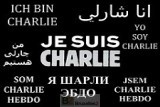The EU doctrine against blasphemy
 (B2) Between freedom of religion and freedom of expression, what regime for offense at European level? This important issue in terms of external relations has been set out in a long document setting the "guidelines" of the European Union with regard to freedom of religion and opinion in the world. A recent document since it was adopted barely a year ago by EU Foreign Ministers (24 June 2013).
(B2) Between freedom of religion and freedom of expression, what regime for offense at European level? This important issue in terms of external relations has been set out in a long document setting the "guidelines" of the European Union with regard to freedom of religion and opinion in the world. A recent document since it was adopted barely a year ago by EU Foreign Ministers (24 June 2013).
It's very interesting. And it deserves a little careful reading. Because what this text says sets a course of action in the face of attitudes that are offensive to religion (or perceived as such by believers) as well as the repression of "blasphemy"...
Admittedly, it concerns, a priori, only the external sphere of the Union. But it is not forbidden to draw a parallel with the situation created by the attack on Charlie Hebdo and the first cover published after the attack (featuring the Prophet Muhammad in a drawing). And it would be quite surprising if the European Union took a different position within its borders.
“In the face of threats of violence, acts of violence or restrictions imposed as a result of the expression of opinions on a religion or belief, the EU will be guided by the following principles:
To. When criticism is leveled at religions or beliefs and the expression of such criticism is perceived by the followers concerned as being so offensive that it could lead to acts of violence directed against or perpetrated by such followers:
o if these criticisms constitute on their face hate speech, i.e. they fall within the strict framework of Article 20, paragraph 2, of the International Covenant on Civil and Political Rights (which prohibits any appeal religious hatred that constitutes incitement to discrimination, hostility or violence), the EU will denounce them and demand that they be investigated and tried by an independent judge.
o If such criticism does not reach the level of incitement prohibited by Article 20 of the Covenant, and therefore falls within the exercise of freedom of expression, the EU:
- object to any request or attempt to infringe such criticism;
- individually or jointly with States or regional organizations, will seek to issue statements calling for non-violence and condemning any acts of violence committed in response to such criticism;
- encourage the state and other influential actors, religious or non-religious, to speak out and engage in constructive public debate about what they consider to be offensive language, condemning all forms of violence;
- will recall that the most effective means of combating what is perceived as an offense and which results from the exercise of freedom of expression, is the use of freedom of expression itself. Freedom of expression is exercised both online and offline. New media and information and communication technologies provide those who feel offended by criticism or rejection of their religion or belief with tools to instantly exercise their right of reply.
o In any case, the EU will recall, where appropriate, that the right to freedom of religion or belief, enshrined in the relevant international standards, does not include the right to have a religion or belief which escapes criticism or derision.
b. In the face of restrictions imposed on freedom of expression in the name of religion or belief, the EU:
o recall that restrictions on freedom of expression can only be those which are provided for by law and which are necessary to respect the rights or reputation of others or to safeguard national security, public order public, public health or morals, and that no restrictions on national security are permitted in the name of freedom of religion or belief.
o defend the fact that the exchange of information on religions or beliefs and the participation in persuasive activities in this regard are protected by international law, provided that these activities are not of a coercive nature and do not do not interfere with the freedom of others;
o recall at every appropriate opportunity that laws criminalizing blasphemy restrict the ability to express religious or other beliefs; whereas these laws are often applied to persecute, abuse or intimidate persons belonging to religious or other minorities and can have a significant chilling effect on freedom of expression and freedom of religion or belief; and will recommend the decriminalization of these offences;
o vigorously oppose the use of the death penalty, corporal punishment or deprivation of liberty to punish blasphemy.
o recall that international human rights law protects individuals and not a religion or belief as such. The protection of a religion o
u of a conviction cannot be invoked to justify or excuse a restriction or violation of a human right exercised by a person individually or in common.


